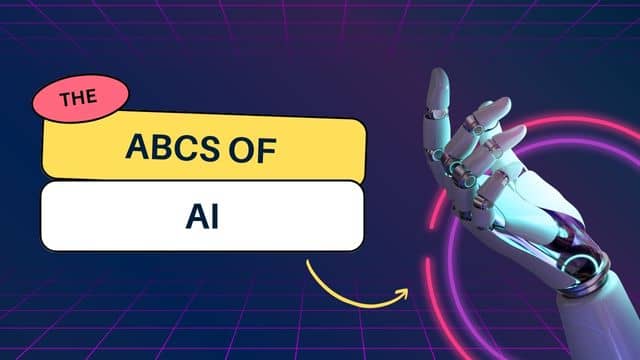In today’s digital age, artificial intelligence (AI) has emerged as a transformative force, revolutionizing various industries and aspects of our lives. From voice assistants to self-driving cars, AI’s influence is undeniable. But for beginners, diving into the world of AI can feel overwhelming. Fear not! This beginner’s guide will take you through the ABCs of AI, providing you with a clear and simple understanding of this fascinating technology.
Introduction to AI
Artificial Intelligence, often referred to as AI, is a field of computer science that focuses on creating machines capable of intelligent behavior. It’s the science of making machines smart and capable of imitating human-like thinking processes. AI has a rich history dating back to the mid-20th century, but it’s in recent years that its capabilities have truly begun to flourish.
Types of AI
AI can be categorized into two main types: Narrow AI and General AI. Narrow AI, also known as Weak AI, is designed to perform a specific task. On the other hand, General AI, or Strong AI, refers to machines that possess human-like cognitive abilities. Machine Learning and Deep Learning are subsets of AI that enable machines to learn from data and improve their performance over time.
How AI Works
At the core of AI are data and algorithms. AI systems collect vast amounts of data, which is then processed and analyzed using sophisticated algorithms. These algorithms “learn” patterns from the data and make predictions or decisions based on that learning. The process of training AI models involves exposing them to large datasets and adjusting their parameters to optimize performance.
Real-World Applications
AI is all around us, powering technologies we use daily. Virtual assistants like Siri, Alexa, and Google Assistant rely on AI to understand and respond to our voice commands. In the healthcare industry, AI aids doctors in diagnosing diseases from medical images, making diagnoses faster and more accurate.
Ethical Considerations
Despite its potential benefits, AI comes with ethical challenges. Bias in AI algorithms can perpetuate inequalities, and concerns about job displacement due to automation are valid. Striking a balance between technological advancement and societal well-being is crucial.
AI in Entertainment
AI enhances our entertainment experiences by providing tailored content recommendations on platforms like Netflix and YouTube. Moreover, AI-generated art is pushing the boundaries of creativity, blurring the lines between human and machine-generated content.
AI and Business
Businesses are leveraging AI to enhance customer service through chatbots and streamline operations through data-driven insights. Market analysis and predictions are more accurate thanks to AI’s ability to process and analyze vast amounts of data.
Challenges and Future Prospects
As AI continues to evolve, challenges and opportunities lie ahead. Advancements in AI are happening rapidly, paving the way for innovations like self-driving cars and more advanced medical diagnoses. However, addressing socioeconomic impacts and ensuring ethical development are ongoing concerns.
Getting Started with AI
For beginners, diving into AI can be daunting. Fortunately, there are numerous resources available to help you understand the basics. Learning programming languages and grasping fundamental concepts is a great starting point.
Building Your Own AI Model
Creating your own AI project can be both fun and educational. Start small, choose a project that aligns with your interests, and select the right tools and frameworks to bring your idea to life.
AI and the Environment
AI’s potential extends to environmental sustainability. It aids in optimizing energy consumption and contributes to monitoring and combatting climate change, demonstrating its value beyond traditional applications.
AI in Education
Education benefits from AI through personalized learning experiences and automating administrative tasks. Adaptive learning platforms use AI to tailor educational content to individual students’ needs.
Myths and Facts about AI
Separating myths from facts is crucial in understanding AI. Superintelligent AI, while a popular concept in media, remains a distant reality. Real AI capabilities are impressive but fall short of science fiction.
Collaboration of AI and Humans
Rather than replacing humans, AI often augments human capabilities. Augmented intelligence involves humans and AI working together, each complementing the other’s strengths. This symbiotic relationship has the potential to revolutionize various fields.
Conclusion
In this journey through the ABCs of AI, you’ve gained insight into the fundamentals of artificial intelligence. From its origins and types to real-world applications and ethical considerations, AI’s impact is profound and multifaceted. As AI continues to shape the future, understanding its possibilities and limitations will empower you to navigate this evolving landscape with confidence.
FAQs
What is artificial intelligence (AI)?
Artificial intelligence refers to the simulation of human-like intelligence in machines, enabling them to perform tasks that typically require human intelligence.
What is the difference between Narrow AI and General AI?
Narrow AI is designed for specific tasks, while General AI possesses human-like cognitive abilities and can perform a wide range of tasks.
How does AI learn from data?
AI learns from data through algorithms that identify patterns and relationships within the data, allowing the system to make predictions or decisions.
What are some common ethical concerns related to AI?
Ethical concerns include bias in AI algorithms, job displacement due to automation, and the potential misuse of AI-powered technologies.
Can AI replace human creativity?
AI can assist and enhance human creativity, but true human creativity and the ability to think abstractly remain unique to humans.


0 thoughts on “The ABCs of AI: A Beginner’s Guide to Artificial Intelligence”